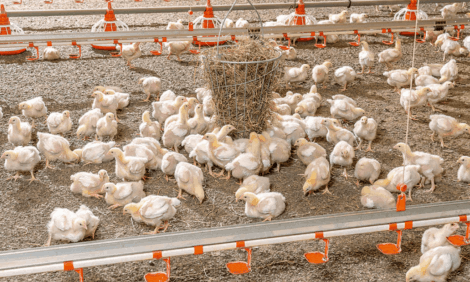



Effects of Light Stimulation During Incubation on Behaviour, Melatonin Levels and Productivity of Broilers
Results from the University of California-Davis indicate that 12 hours of light provided during incubation can have long-lasting effects on chick behaviour although the mechanism for this effect is unclear.Light stimulation during incubation can affect the behaviour, health and performance of poultry post-hatch, according to G.S. Archer and J.A. Mench of the University of California-Davis.
However, they continue, there has been relatively little work systematically assessing the pattern of light stimulation needed to produce these effects or the mechanism underlying them.
Archer and Mench conducted two experiments, published in Journal of Animal Science, to assess the effects of duration and onset of light exposure during incubation on Cobb 500 broiler chickens.
In the first experiment, eggs (n=1,404) were incubated under photoperiods of either zero hours of light and 24 hours of darkness (0L:24D), one hour of light and 23 hours of darkness (1L:23D), six hours of light and 18 hours of darkness (6L:18D) or 12 hours of light and 12 hours of darkness (12L:12D).
In the second experiment, eggs (n=1,008) were incubated in either complete darkness or under 12L:12D, which was applied either for the entire incubation period or with light onset beginning at either seven or 14 days of incubation. Broilers were then housed in floor pens under a 12L:12D cycle post-hatch.
Measurements included performance outcomes, plasma melatonin, general behavioural activity assessed using passive infra-red detection and feeding activity assessed using automated continuous monitoring of feed intake at five weeks of age.
There were no treatment differences in hatchability, mortality, growth, feed consumption, feed conversion ratio, overall feeding behaviour activity or general behavioural activity over a 24-hour period in either experiment.
However, broilers incubated under 12L:12D fed more (P<0.05) than the 0L:24D broilers during the first three hours after the lights came on in Experiment 1 and during the first hour after the lights came on in Experiment 2.
In Experiment 1, general activity levels measured using passive infra-red detection at night also differed (P=0.05), with 0L:24D more active than 12L:12D.
There was a treatment difference between the 0L:12D and 12L:12D in plasma melatonin rhythms during the 19 days of incubation but this difference had disappeared when broilers were sampled at five weeks post-hatch.
Archer and Mench conclude their results indicate that providing 12 hours of light during incubation can have a long-lasting effect on the diurnal rhythms of behaviour although the mechanism underlying this does not appear to be related to a persistent change in melatonin rhythm.
Reference
Archer G.S. and J.A. Mench. 2014. The effects of the duration and onset of light stimulation during incubation on the behavior, plasma melatonin levels, and productivity of broiler chickens. J. Anim. Sci. 92:1753-1758. doi: 10.2527/jas.2013-7129
April 2014











